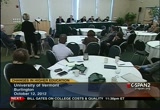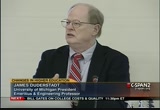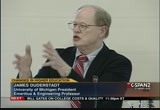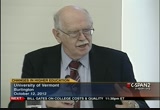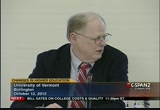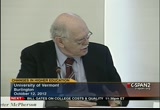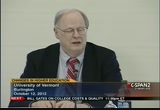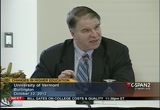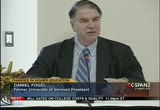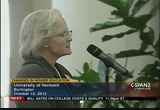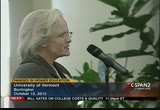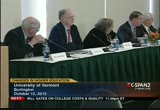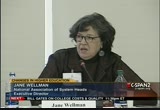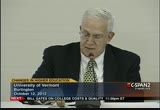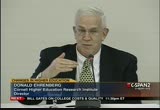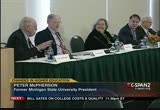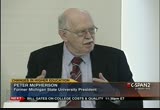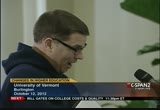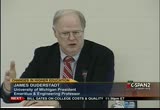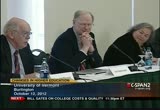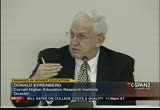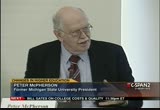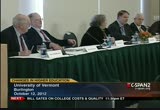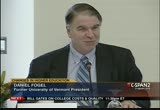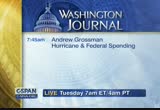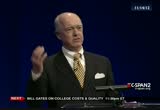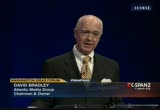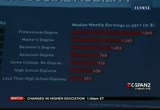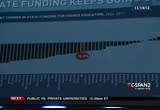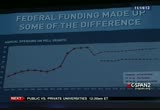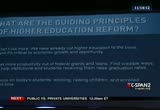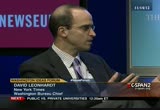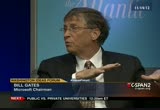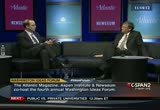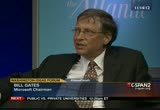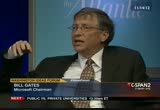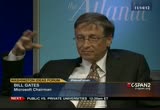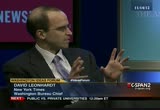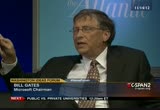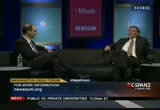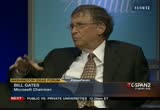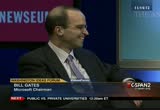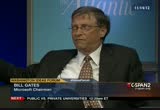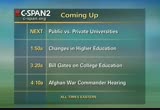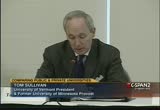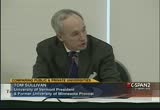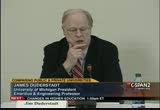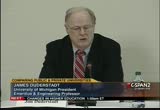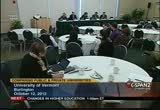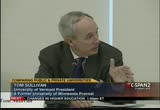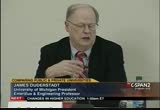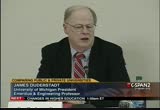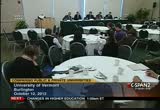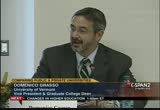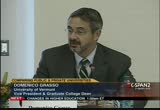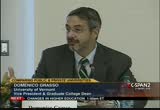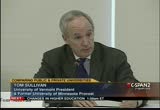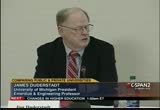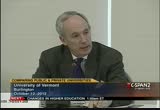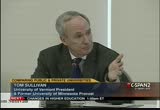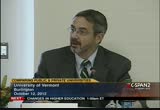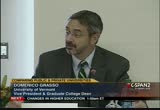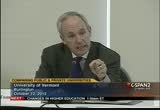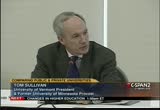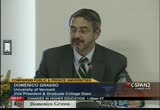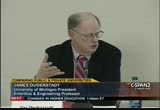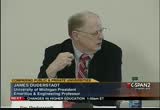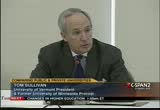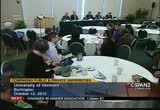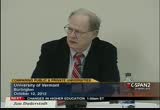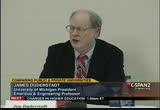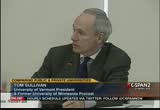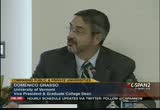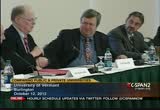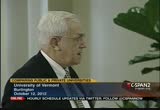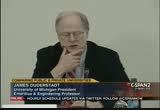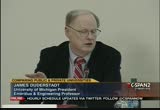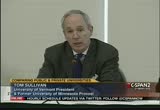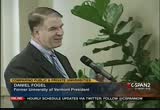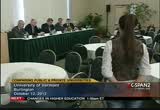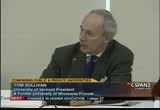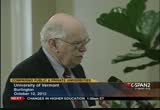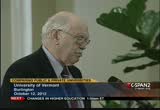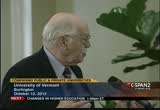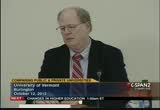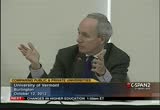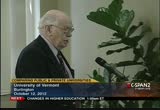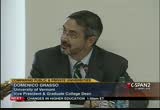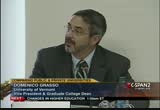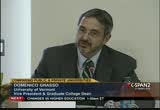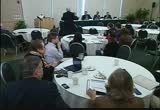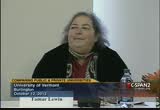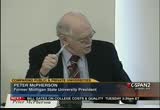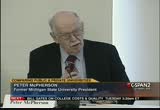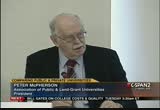tv Capital News Today CSPAN November 19, 2012 11:00pm-2:00am EST
11:00 pm
us. >> there is a lot of movement in the direction. so are we in ten years going to have our first two years -- >> we are starting to see that at this university. >> date recourses mostly. >> what me comment on that. for the last monday and tuesday on a chair in ann arbor are a major national science foundation workshop bringing in the top people from stanford, mit, carnegie mellon involved in this as well as a number of other leaders in these areas. ..
11:01 pm
>> this is not the education we think of as a college education, meaning on a campus with learning communities, the broader experience, but there are certain aspects of learning that occur. there are other formats here. there's a lot of talk about what carnegie melon caughts the open learning model, the intelligent tutor. this is an ai intelligence based interactive situation. i -- ithica and other groups do behind trails on this and found out techniques that are not involved at all, you learn twice
11:02 pm
as deep and twice as fast in certain areas. the third area, i guess it's called interest game, for those who know anything about science fiction, this is deeply immersive gaming. once, again, it expands very, very parpdly, but in each case, the -- rapidly, but in each case, the learning process is significantly different with these than what you see op college campuses which are face-to-face, highly inter[talking over each other] -- interactive, and students learn more in formal settings. it's stimulating a deep understanding of modern neuroscience. enormous potential, but whether it's a college education or not is in doubt right now. >> i guess that's my question. what i often noticed is when i was listening to this is that they are now them going to sort. who are the best students and
11:03 pm
then contract with private industry connecting students to the industry. they are going to this is exiting, the whole cluster of exciting activity is where it leads to like what jim is suggesting, but practically and immediately, it is given credibility. credibility, we should have had it anyway, but it's giving cent to the gateway coursework. we talked about it yesterday that what university of maryland's done. again, working with others on statistics, what virginia tech does, teaching call -- calculous through a self-page
11:04 pm
course, driving down cost, increasing learning outcome. now, if so much of the freshmen year, first year in college is gateway courses and well into the second, i mean, there's enormous opportunity not just to reduce costs, but to also increase -- [inaudible] >> except for the fact that the first and second year of the education is designed to help kids grow up. i think we'll see the real impacts of the courses is in adult education. of course, that's -- it's estimated now by year 201330, there's over a half billion people around the world enrolled in higher education, and most all will be adults, not 18-22 #-year-olds. >> jim, i hope you're not right about that -- i hope that you're right about the adult education, but i think we need to teach things like the first year call
11:05 pm
this year. maybe more faculty engagement, but biology, chemistry, physics, a bunch of the courses, and some say more, and, i mean, there's -- if you can get higher learning outcomes out of a first year course, by this means, then a university typically has in the past, how do you not do it? it seems to me. what i love about this and the rest of it is that now if stand -- stanford, mit and the rest of it can think about these things, why can't everybody else? even though the connection may not be direct and absolute.ññr i'm anxious, jim. >> the real connection between the o dasty, of course, ed x is
11:06 pm
they are involving people who went to graduate school together in computer science of stanford, okay? that's how spinoffs occur. these are effective and currently designed to teach things like advanced programming, and we are now experimenting putting out courses in economics, social science, and so forth, but those are experiments, okay? they are important experiments to run, but, again, i think the big impact of this, and i agree with you, peter, is it's stimulated very serious and very strategic looking at strong dramatic departure from the classroom. >> i can't name you a major public university that's not thinking about this. there probably are some, but i don't know them, and these outcomes and cost questions are really really compelling, but if
11:07 pm
nothing else, the idea we can get better learning outcomes, and we know what they are, it's not that we know you have to be there, but we know what concepts you have mastered. >> you know, i know we want to turn to the microphone, and we will in a sec, but i have to say that i agree with peter, but i also think we should not lose sight of what is special about getting an undergarage watt education at a research university. we are talking about a particular kind of institution, and if we can use the on line learning initiative, rich feedback loop to an instructor in a hybrid course, we're still bringing students into contact with the faculty with whom they will be end gauged with undergarage watt research, experiences, and often very
11:08 pm
early. i mean, one of my favorite conversations with theñ&r uvmñhf first year undergarage watt was when i said to her, what are you majoring in? it's biology, but i'm writing an article on the p-16 gene with cancer, and i asked her what happened to it, and she said it was published in the journal of molecular yes net ticks. that wasñhr a -- genetics. you can be efficient with online resources, but you want to have those students studying at the size of the masters in the research universities. >> i would say i couldn't agree more, of course, with that, but i think that this valet of higher learning outcomes in the
11:09 pm
courses is going to force us to more clearly understand, articulate, perhaps major what you just said about this undergarage watt experience so that we -- it's been a bundle of con cements that we feel and know when we see it, but how can we be sure we've got it? not everybody will be able to afford it either, by the way,, but we -- it's part of going to the university of vermont, and you don't want to lose that. >> let's go to the questions. >> this is fascinating, i'm a little worried about changing the subject, but that's what i'm goinged to do. i want to thank everybody. it's been a real pleasure being here. i worked with a number of people. i'm lucy, worked for a research firm that serves higher education, and many of the people here have. our clients or candidates and
11:10 pm
searches in the past, and i'm struck after the last two days of listening to all of the change that's taking place in higher education and if we were to accept peter's suggestion thatñhr managing change is a sht term job, listen to the characterizations, risky, if not dangerous, and they said you can only watch so many people go in the middle of the road and stand there and get hit by the same bus over and over and over again and realize i'm not going to do that so i'm grateful that dan said there's joy in the jobs, and there's a reason to do it, certainly within the public land grant mission. it's a very, very compelling mission. let's use another met fore. we used tug boats and busses and
11:11 pm
roads. i'm thinking of baseball, and you have a picture of a pitcher, bring in a relief pitcher to change momentum, intended to be short term positions. what happens in education after that? what sort of leadership do we need post-change? where are those people now? where are they getting their training and mentoring? i venture to guess none of you knew or could foresee the amount of change facing right now andñr probably didn't train for this. that's the question. where are they going to come from? what sort of leader do we need? >> i think this is not a short term problem. i think we'll now part of much of the rest of the economy and
11:12 pm
world where change is perpetual, jobs in so many wonderful ways, are hard jobs, need the intellectual and emotional capacity for the struggle and change. >> i think the issue of identifying the next generation of leadership is a huge one, and i do worry about it in public and private institutions as a generality. i think we are over administered and under managed. we don't have a culture of thinking about the development of talent. we -- long history is not really respecting -- respect is the wrong word, recruit people for scholarship and fundraising
11:13 pm
abilities, not because they know how to manage complicated institutions. i think much more attention needs to go to it. i do think that smart people and people -- i think there's a lot of idealism in the academy. i think people see these jobs as an opportunity to do something important. they see them as an opportunity to make a difference, and that's all true, and so i think we will likely be lucky to continue to attract very talented, highly motivated, entrepreneurial people. we have to be supporting them better than we do with more thoughtful attention to transition and leadership and a little of the job development so they don't have to stumble into their own version of figuring out where the finances are. that shouldn't -- those kinds of things can't be taught, and more should be done on that. >> it's interesting it used to be the only way you were a president of a research one university is if you had already
11:14 pm
been a president in another institution or if you were at a provost position, but what we're sort of seeing now is that there's so many veigh capxd sigs and turnover that we're looking down, and it's app interesting example. he was neither president or provost. that basically, and i'm sure you're doing this in the practice, you know, looking for people who have demonstrated ability, and you think can grow into the job, and given the fact that as -- as we've talked about this position of the deans are increasingly important, that there are now many people who actually will jump and move from a dean position directly into the presidency, but the real
11:15 pm
danger is that you need to have experience working with boards. if you don't have experience working with boards, you flame out quickly. that's essentially, i think, what -- i was not on the cornell board, but that's what happened with lee cornell, and so i think that universities have to mentor new leaders. >> we need a board boot camp. >> excuse me? >> what do you think9&r a board boot camp? >> well -- >> you look at all the flame outs -- >> no -- >> just about all are related to the boards. >> there are issues about board-president relationships and improving that, but just the notion of doing things, like, making sure your president goes to the harvard or penn institute or making sure you assign a senior adviser, for many years, frank was often hired as a
11:16 pm
consult when a new president came in and look at the lay of the land and be a mentor who the president could turn to. we have to worry about how do we support our presidents? don't assume because someone's at the top that he or she is okay. they need support. >> let me suggest a business line for you. >> oh, okay. >> having served as chair of nomination of governance boards on forchip 500 companies, one of the things they have responsibility for is succession planning. you always have to be thinking what if that ceo that's sitting at the head of the table is run over by a truck an hour later, okay? there's companies such as yours that are very experienced in how the launch of a succession planning activity, how to identify potential candidates both. the current organization and elsewhere. you need to have a road map of what your strength is. universities don't pay much
11:17 pm
attention to that, but i think this is a new area that you folks need to move into. >> i wanted to pick up on that same point, and in a fortune 500 corporation, if there aren't -- if you're not working op it, you don't have at least one preferably a couple people as possible candidates in case of immediate need, the board, generally thinks it's not doing its job. >> [inaudible] >> if it is your responsibility. we, here in vermont, you had this wonderful success with dan fogel and now a wonderful outside person to be president, but in a corporation to have two outsiders come and be president would be regarded as a board failure. >> that's right. >> and it doesn't -- but yet this is the way we uniformly do it. we don't have the status to be
11:18 pm
the president of great places unless we came from someplace else. you can -- if you're a provost, you have to go someplace else to be president, and this doesn't make sense. it's based upon an apt -- antiquated concept of what the role is. one of the best things we could do was begin to adopt the broad mop in other sectors that you're supposed to have people trained and ready di, and then you can begin to have internal people have a relationship with the board so they know the board so that the board knows them. >> let's take one or maybe two more questions. >> i'd like to go back to the op line learning question -- online learning question asked before. most institutions of higher education are dependent upon revenues from tuition. in those classes, there's 50, a hundred students per class which
11:19 pm
generates significant tuition revenues relevant to the cost of the instructor, okay? as higher ed seems cannibalizes those introductory classes, what do you use to supplement the courses on the higher end where i have expensive professors who teach five students, and where the cost per instruction hour or credit hour or however you define it means that that class is losing money every single time you teach it, and i think that's something we're all very excited about with technology, but it seems as though looking at public and private institutions that you all are moving over a cliff financially where you're cannibalizing your main revenue screen in terms of instruction hours, going to
11:20 pm
outsource that. it's wonderful in stanford and mit places, but where's the next stream coming from to make up for those? >> charges. >> going to charge for it. >> i'll explain something a second, one of my colleagues who actually is the father of some of the technology describes a three core competencies. you have to create sophisticated learning communities. people are in communities, don't learn as much as individuals. second, provide access to knowledge resources, libraries, laboratories, faculty. third, to essentially certify that this is close to truth. this is false. provide a piece of paper that testifies that you have learned something, okay? those are the three competencies. that's what people pay for. the way that learning communities are formed, leaving
11:21 pm
the classroom, students learn more from one another than they ever learn from the faculty anyway. student groups are important, but now groups extend throughout the world. that's changing. access to knowledge. at michigan, everything's been digitalized. i have have books where i live, and no one checks them out because they are in the cloud. okay. that's changed. the fundamental role of assessing the learning that has occurred or that knowledge is appropriate, that's changing as well. the functions are kind of the same, you know, the goals are the same. those have immense value and will generate -- just to have value to generate resources. >> i have a different answer. i don't disagree with that, but my answer to your question is good point. [laughter] i think we do need -- we have not figured out the cost structures of the institutions
11:22 pm
and how we're going to price them. we have not figured out what the right balance is, and lower division courses in particular which are already the cheap courses and which have been. there's a lot that has b to -- has to be sorted through, and i think we're a long ways from being able to have that. it's a great question. >> it's a great question, but it is also true that institutions that are afraid of taking advantage of higher quality and low cost don't exist forever so we've got to figure it out. >> let's have a short question, i hope. >> i think it is. i have a question about prestige and rankings. it seems like there's agreement among the panelists that rankings like u.s. news and world report are, shall we say, flawed, and not basedded on outcome, and, yet, universities widely promote the fact that they are -- they gain standing in those rankings, and sometimes
11:23 pm
you can use those at goals. does that make anybody uncomfortable? does that lend credibility to the rankings? are we just stuck with that fact or is there another approach? >> i think if you look at the web page of any university, what you'll see on the web page is whatever publicity the university is getting, and i mean, i actually have done research that shows when you fall in the rankings, all sorts of bad things happen. fewer people apply. it's more difficult to get the students to come. you have to give more financial aid. test scores go down. the rankings do matter, and people say they don't pay attention to them, but that's not the only thing they pay attention to, and so, you know, i think the message is, you can convey on your web pages and written documentation what are
11:24 pm
values, what are we proud of, and hopefully public research universities will de-emphasize the u.s. news world rankings that have nothing to do with graduation, education, and research anyway. >> i think there's no question that to the individual institution, there is a cost to not paying attention to the rankings. i mean, that's -- and people do respond to incentives. we try -- there's heros that say, no, we're not going to, but they are there. i think that individual schools complaining about these rankings has no impact upon u.s. news and world report whatsoever. just say you're self-serving, and, of course, sometimes the institution is. i think we, as a community, we either need to, together, some
11:25 pm
other option, more effectively -- no doubt with the help of the media. i mean this is a societal problem that is creating misallocation of resources and efforts, and we have to call it for what it is or this -- there is inconsistencies here and this is a problem that festered for too long. >> we can play a few cup cakes early in the season. >> right, there we are. >> it's a great question, and we always complain, but we have not dope anything about it because individually, you're powerless too, and how we -- how more broadly this is done with, i think, frankly the media pointing out the counter counterproductivity of the rankings. >> thank you, panel, thank you,
11:26 pm
everybody. and dan gets the last word here. >> thank you. i just want to thank everybody, first of all, for having participated. we had a very rich group. it's changed from hour to hour as people have had to leave, but the participation was wonderful. these are pressing, pressing issues for the well being, not only of our institutions, but of our states, our regions, our nation, and i believe as jim so often says, university like the university of michigan are -- have global reach and constituencies of what happens to our great public research universities in america has cops convinces forñ&r the -- consequences for the world at large, not just for the united states. i want to thank john markus and
11:27 pm
scott, having deeply informed reallied model journalists who are saturated in our industry and have been able to challenge and provoke us as i think growthly enhappensed the value -- greatly enhanced the value of these proceedings. thank you so much for doing this for us and to all of the panelists and keynote speakers, too, heart felt thanks, so, thank you, everybody. there -- for those of you dashing if for the one o'clock r flights, the shuttle bus should be outside the main entrance to the davis center. [inaudible conversations] >> we'll run it back around or i'll give you a lift if you need it. if you're going back to the hotel, they have a shuttle. [applause]
11:29 pm
there are many people who might take issue with grant saving the union during the civil war. didn't lincoln do that? well, yeah, he did. i'm not going to say grant was the only person who saved the union, but he was the commanding general of the armies that put lincoln's policies into effect. he was the general who accepted the surrender of the northern virginia under report e. lee that ended the war so if anybody won the war on the battlefield, if you could say that any one person did, and, of course, you can't, but one of the things we do in history is we generalize. we simplify. history, reality is simply too complicated to get our heads around if we deal with it in its full complexity. grant saved theupon during the civil -- the union during the sieve -- civil war and during
11:30 pm
reconstruction as well. >> in illinois to a courthouse and 1600 pennsylvania avenue, hw brand on the life of ulysses grant thursday night at 10:15 eastern, part of booktv's four-day holiday weekend starting this thursday on c-span2. >> bill gates says the u.s. education system is failing to produce highly skilled workers to grow the economy. he was at the washington ideas forum for 45 minutes. >> thank you very much. we have a writer who very occasionally writes for us. he's a public intellectual and map named bernard -- bhl as he's known, a moral and political philosopher, and he's a bit of a public celebrity so he's a man deep into his 50s, has shoulder
11:31 pm
length jet black hair, his signature look is he keeps his shirt unbuttenned all the way down to the belt, and he's a big personality. the argument about him in france is that he's equal parts vanity' for every part scholarship so a self-evidently envious political philosopher in france said define bhl's political philosophy as god is dead, but my hair is perfect. [laughter] so i've reserved a little piece of vanity for myers here. across the whole program, i just wanted to do one thing which is to introduce bill gates. walter isakson, my colleague in doing this work, did a story in 1997 about bill gates. here's how it ochedded. bill's parents decided he needed counseling. he was at war with his mother,
11:32 pm
mary, outgoing woman, who harbored the belief he should do what she told him. she called him to dinner, and he wouldn't respond. what are you doing she demanded? i'm thinking, he shouted back. you're thinking? yes, mom, i'm thinking, he said fiercely. have you ever tried thinking? [laughter] the psychologist they sent him to, a really cool guy. he gave me books to read after each session, freud stuff, and i got into psychology theory. after a year of sessions and battery of tests, they reached the conclusion you're going to lose, he told the mother, mary. just adjust do it because there's no use trying to beat him. mary was strong willed and intelligent herself, but she came around to accepting it was futile to compete with him. here's an interesting fact. my 91-year-old mother is here in the third row with us today.
11:33 pm
[applause] i had an upbringing that was full of affection, but i had ever said to my mother "yes, mom, i'm thinking, have you ever tried thinking?" we'd be talking about it right no prompt -- front of you now, still. he's had two chapters of thought in the career. for 30 years, he was the dominant intellectual force in the personal digital revolution, and the most recent ten years, the leading mind rethinking global philanthropy. when he was in transition between the roles, i went out to the gates' foundation to visit a friend deep in the ranks there, and i was in the office, and i said look at the screen. i went over, there, 20 were from
11:34 pm
bill gates saying bill is teaching himself organic chemistry, andñi when he gets stuck on a problem, he sends it to me. he gets some measure of the force of this gran nuclearñ.' masterful mind. nip know how many cases of polio there were in india last year? there was one in 2011, and there's been zero since that time. down to three countries that have polio. this is one of the works of the gate's foundation. bill is going to come and out talk for a few moments on another passion of his which is u.s. education. he'll speak here for a few moments, and we've asked david who is a bureau chief of the "new york times," to come out, join bill up here in the stage
11:35 pm
and continue with an interview for a few moments. i spoke to david ahead of time asking if he'd do the interview, and david is a pulitzer prize winner, and he asked is there a gate's prize? i said, no, there's not a gate's prize, david, and i hope i didn't take too big a liberty here in asking him to come. i have committed on behalf of the gate's foundation, when there is a prize, david will be the first recipient. [laughter] let me present bill gates. [applause] good afternoon. i want to talk a bit about higher education. the reason i picked that is because i think it's been a huge strength of the united states, very important thing that's
11:36 pm
allowed us to fund our broad set of activities, allowed us to be a leader in the world, and the world depends on us doing it quite well. education is one of the two big areas that our foundation is focused on. here in the united states, virtually everything we do comes under that umbrella. there's a lot of scholarships, work with libraries, a lot of work with k-12, but work in higher ed is a growing activity and one that we think is at a very important juncture. another way to look at the talk is to think about it as a specific case study of some of the budget tradeoffs that will be made in the years ahead. the federal government plays a very important role in higher education, and the choices made about those policies are not going to make a huge difference. one way i look at this is i say, hey, we do have -- point in
11:37 pm
various directions -- [laughter] so this is a case study. why does our foundation focus primarily on education, and why do i think it's worth addressing today? well, in a sense, whether it's the agenda of the equality orñ&r the agenda of innovation, the agenda of growing the economy, creating jobs, education is very much at the center of that, and it's fair to say that in many aspects of education, the united states has been the leader. universal k-12 education, broad ping -- broad ping -- broadening that out, higher percentage of education going to our country, research and higher
11:38 pm
institutions working to the, connecting to start up enterprises. when you look why are we the leader in biology, why are we the leader in i.t., the strength of our universities is a big part of that, and so this is something we should make sure we don't lose as we look at our investments in the future, and it's also important to take thought because other countries over the last 20 years have noticed that we do this very well, and they've adopted the more successful elements of our higher education system, and so they, in someñ&r ways, have movd ahead, and looking at what's worked for them and how we're going to stack up, i think, is very, very important. this gives you a sense of the jobs question, the income question, and how that connects to education. you know, people say, you know, we need more jobs. well, in certain areas of
11:39 pm
college educated, like college educated with software engineering degrees, there's a human sornlg of people. if the country would change us immigration policies, that would actually allow these over a hundred thousand dollar a year jobs to -- some of them -- to be fill by people who go to u.s. universities and today, they are not able to do that. even with that, you'd still have a big shortage. if you look at professional degrees, there's 2.4% unemployment. that's as low as it can go. even in the bachelor degree, 4.9, you see in many areas, it is very, very low. we have the irony of having an economy where people are wanting to get jobs, and, yet, there's a lot of open jobs, and it's up to
11:40 pm
the education system, and as you go down and look at the dropouts, there's a dramatic increase, and, of course, a dramatic reduction in the weekly wages. it's no exaiming ration to say whether it's about income equity, raisht equity, that the key issue is making this overall education system work for everybody in the country, both k-12 and higher education. now, fortunately, we have more people wanting to get into this system. there are questions whether there's additional capacity or not, but it's a wonderful thing that you have more people who not only want to go, but actually enroll. that's a very substantial increase over the last five year period. however, if we look at the
11:41 pm
financial picture state budgets are simple to describe. they are spending more on medical costs, whether that's their medicaid, current employees, retired employees, people in jail, more on medical costs coming from different sources, and because they don't have that much more money in total, a lot is coming from reducing education spending, and, often, they cut the higher education piece before the k-212 -- k-12 # piece, although, there is variation in that. you see a significant cut in state support. the institutions are the ones that provide broad equity. yes, there's wonderful private schools at the high end, and there's some for-profit schools, but the bulk of people are going to two and four year state institutions where this money has been key. now, as a result of that, and
11:42 pm
increased cost structures, the tuitions have gone up. i can see there, that the four year tuition's gone up quite a bit more, but that's where you get the greatest opportunity. a huge rate of increase, and the question is will that continue? what's that mean about affordability? this shows the pell money,ñhr oe of the fastest growing areas of federal expenditure. you see how dramatic that was over the last four years where pell has gone up to a huge level, and so a little at state funding has been withdrawn, federal funding through pell grants have come in, and this is an area of theño' budget that's particularly challenged because the mandatory funding piece of it is actually not funded so even under the current budget projections without any cutting to the discretionary budget,
11:43 pm
this has a very dramatic short fall over $8 billion a year, going forward, and so just to meet those numbers if this is not increased, you take pell eligibility and maximum and drop it in a fairly dramatic way which, of course, in terms of access to higher education and basic trend we'd like more and more people to go will work very much against that. now, one of the ways the equation's balanced out is the borrowing levels that are up quite a bit. in most cases, those going to state institutions, this is not yet a troublesome level. there, are, of course, some cases where it is, but overall, if we plateaued out at this level, it's not a huge challenge. it's fair to say that's there's not room for increase here, otherwise you're going to get people who are never able to
11:44 pm
just discharge those debts. one thing that i think is stunning, and it was unbelievable to me when i first learned about it is the lack of completion. the united states ranks very high in terms of the number of people who enter two and four-year program. we're in the top five, but we're not in the top ten, not even close to the top ten in terms of the number of those who complete their degrees. completion rates are much lower than other countries. [laughter] that was stunning to me. to first hear about that, and then, of course, the number for the two year students is even more. within three years, 30% complete, and there's best
11:45 pm
practices to be applied here, where you look at students, see where they are not engauged, to bring in support for those students. there are probably ways that we can structure grants and loan programs, and our foundation put out a number of contracts, people challenging them to look at whether the structure of the money that's invested, the way we measure higher ed, how people pick institutions, the way they track students, if we can't do a much, much better job. you know, the bottom line is that there's 12 countries that got highway of us which is very much a new phenomena, and, you know, definitely something that takes away economic leadership, and, actually, the amount of money spent on the kids who don't reach completion than the damage done to them in terms of their self-confidence and debt levels is pretty bad.
11:46 pm
the job market wants the graduates, and it's hard to project, but there's a $3 million short fall even just going out to 2018, and markets can tell what happens is those jobs appears in other countries. private sector find engineers, find those people somewhere, and so it's -- the u.s. has the opportunity to have those, but, you know, they won't wait around. now, when we think about this completion thing, it's interesting to look, in particular, at the people who get federal grants. say, okay, are these people because, you know, they had to apply. are they doing particularly well? the answer is, no, they, you know, pretty much typical. here we have in four year, the percent who get a degree, dropped out, going, and likewise
11:47 pm
for the two year. you see this pool is just like the overall pool as a whole. what do you do going forward? obviously, the level of generosity for the programs makes a big difference. i'm surprised the visibility on the pell challenge has not gotten more visibility. we've so many fiscal issues, it's easy for even something as important as that not to get the attention that it normally would. we also have to look at the structure of the policies, the kind of incentive structure they create to get people into the majors that they are going to complete, to get the schools to actually pay attention to the students. we wantñhr to reward the schools that have high completion rates, and the foundation's done a lot to ensure we have really good measures of this, you know, the ultimate thing would be to do what some people talked about doing for the for-profit sector, which in my view, we should do
11:48 pm
broadly, is look at outcomes in terms of employment, salary levels that are the outcomes across all institutions, whether they are for-profit or non-profit, and use that as a learning opportunity. you know, how are they falling, and what institutions, contrary to a u.s. news and report type ranking, who takes the people with the low sat and educates them in a way that they do very, very well. that's what should be rewarded, and, yet, the competition for who enrolls the best students is not a measure of what you're doing for those students. it's just about exclusivitity, and that's a trend to be bucked, and i think federal policies on these things, i think this is a real opportunity to take advantage of those. another thing we have to keep in mind, if we do this, it's one the very positive things is that technology is getting us to look at new ways to educate kids. do we need the big lecture
11:49 pm
halls? can we have some degree of personalization through the personning experience? should it be a hybrid with op line activity like with the massively online courses, and for the students who are less motivate, you hybridize that where there's some face-to-face activity, but it's in a way where the cost structure of delivering it is not nearly as high as it's been in the past. there's a lot of promise there. definitely one of the things that, because it's app early stage, people can get over excited about it, but over the next two to four years, measure it, and not just against the students using it so far, but with the bread and butter courses like math and the first courses and against the broad student pole like the long term students, i think we will find opportunities, and, again, the policies need to end courage schools embracing this in the right way, and taking the
11:50 pm
tougher students and making sure they get great outcomes. a big challenge, and one that i hope doesn't get lost in all of the big numbers of a very important part of the discretionary budget that we have to be smart and preserve as much as we can. thank you. [applause] >> thank you very much. thanks for doing this. so it's hard listening to that not to think about all of the discussion that we've had about education and education reform in this country over the last decade, and so much of it has been focused elsewhere; right? it hasn't been about college, but k-12, charter schools, and there's often, it seems to me, an assumption that higher education is working find.
11:51 pm
it's the top level, the berkleys, the private schools, higher education remains, you agree, the envy of the world for good reason. i guess i'm interested as maybe this discussion about higher education and its problem becomes more widespread, what are really the big things that policy could do to demand more accountability from higher education, the same way we see with no child left behind and race for the top in education. >> yeah, i think the last temperature years in k-12 involved, first, level setting to see where the system was falling short, to really understand that we have a third of the kid dropping out in high school, and see that in the intercity schools, that was over 50%, and taking the examine results and seeing that both this absolute and an relative basis, our schools were not doing ad good job. i'm fairly hopeful, again, it's a key area of funding that the federal government budget plays
11:52 pm
a meaningful role, percentage of higher ed, hopeful of the things that are going on. the teacher personnel changes that a lot of states are leading on, the improvement in the curriculum where there's a common core approach where states share a much better, more interactive curriculum, and the use of technology coming in and helping it out. i think that weñm/ are seeing s where interventions areñhr applieded. there's improvements at the current level of spending. as you say, higher ed is not in terms of recognizing we have to rededicate ourselves to what's been not just at the elite end, but broadly a strength of the country. they are amazing schools, and berkley's an example. it's a state school, but it's a totally world class institution, and the tradeoffs made today
11:53 pm
because of the state budget cuts that they had to go through, the question of will they routine that excellence five to ten years from now is an open question for the those going to higher ed, we're already not doing what we need to do, and, yet, the economy is pushing us. if you care about jobs, you got to get more people through meaningful four year degrees, and so what's that look like? >> does that look like states saying to their colleges we're not giving you money for enrolling kids, but if you dramming wait them and demonstrate they get jobs? what's it look like? >> well, absolutely, i think that the first thing is the measurement process, like a truth in lening thing, students looking at going to a university, legislatures supporting universities should know the completion rates, and
11:54 pm
just like we did for mclb, there's granularity there. bit by bit on degree programs. get income status as an output measure and see how different schools do. you know, we just can't compete in exclusivity, and whether legislatures then are willing to take schools not executing well and give them less funding, we'll see, but i think that peer pressure, if this was being measuredded, and if they saw a practice where for a pretty small investment in really seeing who is going to class, a few schools, even in this area, the for-profit sector does a good job, there's meaningful improvement and completion quickly even though it's, you know, not subject to the normal supply and demand
11:55 pm
characteristics. >> i've been to west virginia, and i've seen a program there where they say to kids that drks the kids qualify for the big in-state scholarship only if they remain op track to graduate in four years. there's academic research that suggests it's lifted graduation rates. you've been to tepees, i believe, and the -- tennessee, i believe, and interested in the organizations. does it feel we're at the early stage of interesting experiments in higher education focused on compliewtion -- completion or still there's the exception that it's hard to have too much optimism? >> completion by design, schools came in, agreed to publish a common measure, look at best practices, that started three years ago, and for those schools, and there's a selection bias, you know, the more open minded to doing things in new ways, they have seen a meaningful lift in their completion rates. it's getting on to the agenda. you know, the fact that some
11:56 pm
schools have below 30% completion rate, that's not as public as it needs to be. states wentñhr to giving gradeso schools, you know, tough medicine, this school is an a, b, c, d, e, that caused change. i'm afraid we have to be doing the same sort of thing for the universities because they are not right know, much more insent vised on who they let in and not what happens once there. there's the students are happy, the teachers' are happy, and the quality of what you get when you complete is another thing we have to look hard at. u.s. students are spending less time in class, higher education students, than the other rich countries. they are spending less time outside of class in their
11:57 pm
studies. we are uniquely -- we have a unique amount of free time -- [laughter] for our kids who are going to higher education. >> do you think that's happened? i mean, is it a cultural change? >> all systems, if you don't have a measure, they kind of relax. you know, state schools are competing, you know, who's got the best storm, who got the best climbing wall, just to get a high average sat score coming in, you don't invest in your teaching activity. teaching, as we've seen in k-12, it doesn't have a tradition of measurement. the only measurement that exists, very much in higher ed, is a student independent rating, but that tends to be heavily influenced by how easy the class is as opposed to how rigorous it is. it's a combination. there's degree of rigor, and,
11:58 pm
actually, in science and engineering, we see that rating tends to emphasize the rigor part because theyñ&r really know they are going to apply to garage watt school or have to have specific skills for the job whereas in other areas, more and more, it's tended to focus on making it easy. because we don't have something that's pushing, constantly wherings you know, university president comes in every day and says, you know, my output excellence is falling short, you know, instead they say, gosh, you know, i'm going -- i promisedded my board i'd up the ranks in u.s. news and world report, and the more you spend per student, no matter how you spend it, you raise the ranking. the more people you exclude, th. who is going to add capacity to the higher education system? i mean, we're not having a hard enough time with pal, loans, and state funding for the current capacity, but the needed capacity if people care about
11:59 pm
jobs, it has to increase, and actors, with very few exceptions, are not adding capacity. they ran into problems they had, in a bit of a retranchement, and state schools, like arizona state university, expanding, is very, very small. you know, the only way to scwair this, probable, is by alerting people to the problem and keeping it as añ&r follow-upping priority, and then bringing in digital approaches that really do -- are -- although, early stages, showing real promise. >> there's an analogy to health care. two huge sectors that for somewhat different reasons are central to our economy right now, and they -- it seems to me, necessarily are going to evolve in a big government role because the private sector will not always do them. right now, there's down sides of
12:00 am
12:01 am
profits but there's a certain element of what they're doing it just happens that they're motivated by the wrong measures. we need to have these alternative measures to be the parts that is today is in the science department they really do compete so that kind of stands apart in terms of its rigor that is very healthy and in many of these departments over half of the kids aren't u.s. citizens so the benefit of the education occurs to other countries. they are not allowed to stay and they have open jobs for them so that is a bit weird but that sector to competition for the research grants, the sense of
12:02 am
new ideas is very strong and all sight of that we have a huge problem. on average if you take the time out you go 12 hours a week and they're spending 12 hours a week on their studies and it's something that's just gone down over time and even so they are not completing at the rate that we would like to see so this engine is on examined and if we come up with metrics people will compete. they want to do the right thing but the exemplars until you get the measures people don't compete to match up to them sit here is what a skeptic would say their spending 12 hours a week in the class's and taking too long to graduate we shouldn't be focusing so much on getting the kids in college there are many
12:03 am
very successful people in their life like bill gates who didn't graduate from college. i would love to hear you kind of engage in the skeptics a little bit. >> yeah, well if liking to take the courses is good i have a datapoint that says taking courses i love taking courses. i happen to do it outside of a formal degree framework, but absolutely is great for a lot of kids to go to the two-year programs. they are wonderful professional degrees and some of them are also as feedback oriented as i am seeing if the local employer needs welder's but it doesn't teach the right things that
12:04 am
employer says let me help you get this equipment and go ahead and advertise and some have been very dynamic to look at the employment picture and change their programs and i visit a lot of those. they are not that well funded but they are very scrappy about how they go and do things, so that is definitely part of this ecosystem is a two-year associate's degree. in terms of high school there will be decrease in employee ability of someone that just has a high school degree no matter how much they work on the k-12 agenda the nature of the economy they have a high-cost economy and the degree of the automation towards the simpler jobs automation is getting rid of more of those jobs than the global competition. they're both there but automation is the biggest piece of that. you are not going to get rid of that. so at least we have to have more people getting those degrees.
12:05 am
ideally we would have more people getting the four year degree. if your view is okay they are not motivated what do they do should get to 1822 there is a cohort that is highly motivated to look at students who get a little bit of school and then they come back and when they are older they have in mind a job they want to do and there's all selected. it's a very small percentage of that court but in fact we ought to take them out of the numbers and of course these numbers would be very worst. they are amazing. even the kids that go through and transfer to forger schools have a higher completion rate because it had to go to trouble to get to that transfer process.
12:06 am
so so society needs to do something and we are not stepping up to it and your sense is that even though it's not what it could be on average kids who are graduating from college are still getting a lot of skills and the labor market's bear that out . >> i wish that kids got more information about the employee about the relative to what the major and universities peck. i do think there is an information failure that could shift kids in terms of picking better schools and picking their majors that he would have a better match between the labour market and those things. but on balance, if you don't go to a four year school you have
12:07 am
more chance of going to jail than getting a decent job, so i don't think there is any picture that doesn't involve getting more people to go to the university's. somebody can argue that with the on line techniques a lot of people can complete that degree. there's a good discussion about that. the boundary between the cade 12 university can't shift some of that in a lot of it is spent in college radiation and you get a great agreed in high school and apply to college but they tell you what ever the score places using you have to go to this class. the dropout level of those kids is over 70%. so, some improvement of the k-12 so they get basic skills and then even a few college credits in some cases probably can't
12:08 am
shorten the period to more light a lot of people but the breadth of knowledge or the maturity you're going to be suited for the job market of the future. >> mike is the president of the foundation with the version that i've heard he says the -- i am still waiting to meet the higher education skeptics who don't send their own children to college. >> anybody can get into those institutions that is the four years of stimulation that's really a wonderful thing. everybody will always aspire to that it's too injured thousand dollars of cost. that is completely unaffordable so whoever gets it should feel
12:09 am
very, very blessed and no matter what we do online there will be some unique aspects that the very few that get to join the club will still find it quite attractive. those schools are not even with their huge prices or relative price increases they are not in any danger. it's what we do in the state schools where the idea of equality and getting the jobs market back is far more. maybe you should pay less tax if you're going to employ 1 million dropouts. jobs aren't a finite thing that somebody decided to create. there is infinite demand if you have the right skill set because you have the companies and all sorts of things.
12:10 am
so, the key to the jobs market is far more this education dilemma. people mix of what happened in the short term crisis verses what is going on which is are the jobs mismatched in the education problems. >> reading between the lines i think i year with one exception that we can get to fairly high marks to the current administration education policy banning the focus on the funding of the fact they talk about completion and they think it is worth spending tax dollars to do these things. is that right? >> no one solved the budget problem so you know where people's priorities are after they solve the budget problem. everybody's for everything pretty much okay. there's a few things people are not for the voters are certainly schizophrenic. they are for lower taxes than all of the spending. and just this whole thing up.
12:11 am
so it's easier to say what the priorities are once you've gone through the set of trade-offs. but absolutely, the department of education and what they did in k-12 and what they're looking at i think these have been four good years. they've been willing to challenge the status quo which even some of their constituencies were very uncomfortable with that challenging the state and i think even at the state level this is somewhat bipartisan to cicatrix what we need a personal system in places like colorado or tampa in florida they are things i'm very excited about what is coming out of those in the learning from charter schools say yes and k-12 the last ten years as painful as they have been i think we are getting some good things out of that. higher ed, our agenda has some completion, not nearly enough, a little bit of focus now on this technology peace but the financial equation i find it
12:12 am
scary hell it is pointing in one direction which is less people going to higher education whereas the economic compared if people seem to think we want people to be employed. that plant in a completely different direction and if you cut the discretionary spending and education to accept proportional percentages of those cuts the way some people are talking about, i will tell you your own employment figure and will be very high and will be class structured. that's the thing people don't highlight how differentiated this i think that's been missed somewhat and therefore you miss the role of education and that we are headed towards a real problem and we haven't challenged these institutions to be better. we are looking at how we do the
12:13 am
grants in the right way. >> have they done too much to crack down on the for profits? you have positive things to say of the for profits in this administration has been pretty tough on them. >> i think that all of the things that were discussed of the for-profit ventures were actually pretty interesting because those measures should be applied to all of tools and so they talked about at least publishing data on who has jobs. they figured out how to get the income data and what those would be. i think it's actually suspended right now but i actually think the for-profit people the cost per degree on average and there are some out fliers with their cost is actually lower than the state systems. it just doesn't look that way because we have all of the state subsidization this kind of invisible and the completion
12:14 am
rates of the for-profit even without adjusting for the fact that they are taking poor kids, less educated kids with a very good completion rate. there was over promising and over spending on marketing and there were some things that the fact there are some good things about that if we could get it right and get good output measures the fact is that is one of the pieces that could go back to grow with the right controls in place so i think there were some good discussions and i was surprised people didn't broaden it to the issue of what about the ones that we subsidized? why shouldn't we care as much about that as the ones that at least when they do pay off their loans they haven't had to take any liability whatsoever. >> it's like you're saying the crackdown on the for profit. it was that it was too small to be ischemic looking at the sectors of the efficiency and
12:15 am
effectiveness, yes that sounds a little rude but i say that. >> what we stand on something a little beyond education. you talked in the past about the climate of of all of these long-term things you can make a case for optimism and education and optimism and public health. can you make a case for optimism about the climate? >> absolutely. almost every problem that people get pessimistic about of the house to do with the fact that they are not aware of the potential for innovation in that space so they take the kind of static view like new york city about 1900 had a horse manure problem and they just did the projection. it was bad. they just couldn't see their way out of it. slowly but surely they got. you have to be careful in
12:16 am
center-right innovation. health care may be the case with very expensive low impact innovation and we are not prioritizing the cost reducing important innovations. we have to look at the incentive which is very broken in u.s. healthcare and as we just discussed in the higher education. in the case of energy, we will get an expensive los co2 energy source. the problem is that the amount of time it takes to get a chance, make economic goals and deploy those things in the sector that moves jury slowly is correctly and there's been often some great books that go through this we have to kind of up the invention and wit in the fields there are people like me who think we focus too much on the deployment of stuff that we have today verses funding the basic research that can give us things that don't need to be quite as subsidized when they get out
12:17 am
there so i think there is a scary place going on and i am worried that we are not paying attention to it in terms of do we get the new stuff before the amount hurts the entire globe in those regions and subject to that. but even there i think the right things can come up with a good solution. >> and what is your policy right now to try to help the good side of that race? >> i think to the degree that you are funded you should shift money away from the tax expenditure on deployment which is accelerated depletion. you should take maybe even 10 million out of that and put five to 10 billion back into the basic research piece and i believe you would say that when the economy is better you will have a significant carbon tax. i know that is politically difficult but in terms of incentive in the right behavior and the right innovation, the
12:18 am
12:19 am
now a discussion on the relationship between public and private universities including a comparison of the faculty pay and what may lead to jobs. from the university of vermont this is an hour and a half. >> good morning. welcome back to the program -- to the conclusion of the press of this or the crossroads symposium on the future of the public research universities. before i introduce the panel just to remind you all as you may see we are being filmed for
12:20 am
c-span so when we get to the q&a portion today, it's important to use the microphone and you will do better than it actually turned on. thank you for your interest pi want to introduce a topic that we are on first this morning and then turn it over to the discussion with our panelists and then to get you involved. we are talking right now of about research, scholarships and the arts at the great public research universities, and in essence what we are talking about i think is the faculty. and the faculty role and who the faculty are and as well the future faculty including the bridge with students. and i would argue that we are in a time of huge challenge in the ability of publics and universities to recruit the best to retain the best and to sustain the kind of conditions that create outstanding leadership as well as teaching. it's little remembered today and
12:21 am
i find that when i speak to audiences in the public and say this it surprises them that 50 years ago it was not a given that the best programs and the best finance programs or the elite private institutions in fact the very best in many areas would be found in the public's. people have heard him say the rebound would say the berkeley physics department also now every year people talk about what is in decline but think about pervez like history of the university of wisconsin, the social sciences and michigan at the university of michigan you have all sorts of areas where for much of the history of the education the very best didn't necessarily go to teach and to do the research. today though we are in a period of significant disadvantage for public universities and attracting and keeping faculty.
12:22 am
to give you some figures on the salary just to set the stage, the average full-time faculty member at a private research university this year is earning a little more than $162,000 at a public that figure is $120,000. the average salary for an assistant professor at private research universities is 89,000, which is greater than the average for an associate professor at public universities which is 82,000. it used to be that if you looked at great research universities, public and private that were close to one another, so dealing with the same cost-of-living that many times the public would pay more or at least was equal. now if you look at say stanford and berkeley, stanford is paying on average $40,000 a year more
12:23 am
to their full professors than berkeley. duke, $30,000 more on average fan chapel hill. in fact, chapel hill professors earn less on average than those at wellesley college, a very great institution but a liberal arts college which typically wouldn't have been having the salaries of a great research universities. here in vermont looked at the data and middlebury his more on average and the university of vermont for every faculty range. and if you look at the figures, the top figures for the assistant professors, is talking about the future talent, you have a situation where there are nine universities in the country where new assistant professors earn six-figure salaries. eight of them are private and the one that is public is primarily a medical institution so arguably on its own pace kill.
12:24 am
the future here very much favors privates and attracting and retaining talent. it's not just in terms of salary because obviously many people in academe choose their field not because they want to get rich but there's a call to the academic life. but it's beyond that. i spoke to a research university president of a public institution this year and we were talking about counteroffers that his institution has to make. he said that when he was lucky he could raise enough money somewhere to match many salaries but what he couldn't match was the condition of the buildings, the ability to produce the number of graduate students desired by the faculty members to work with him and he also couldn't match the course reduction where a private research president can offer pretty amazing package overall to the store faculty but it's
12:25 am
very hard for many publics to match and this turns up all over the place. a kind of as a result we see right now when you are talking about how to sustain excellence in scholarships and research you see a lot of soul-searching going on in the public higher education where institutions are trying to think about how private they can become. so many institutions have basically given up on the state and as i was reminded here just this morning there are institutions like the university of vermont that have for years straddled a public-private relationship and have some characteristics and some history but for many institutions there is no such history and talked of becoming more independent can be very controversial and very upsetting to many people coming and yet to many leaders in the public never sees if they don't talk about that, they feel that
12:26 am
their excellence is in danger. we see there's a big debate right now over getting a ball of the state funds for the business school. you see that the date two years ago at the university of wisconsin madison where a chancellor tried to become more independent and perhaps it's not a coincidence that chancellor's now the president of the liberal arts college in massachusetts and no longer in madison wisconsin. these are very difficult issues to deal with and we have today a panel of people that have been trying to deal with these issues. i just introduced them very briefly starting at the end on my right we have tom sullivan, the president at the university of vermont and our host today and previously the senior vice president for academic affairs at the university of minnesota. then we have jim, the president emeritus and university professor of science and engineering at the university of michigan and many panels trying
12:27 am
to grapple with the future of research universities and public research universities in particular then to my left we have the vice president for research and dean of the graduate college at the university of vermont and and then at the upper and we have william daars at the university design and the office of the president of arizona state university. they have answered a number of questions in advance that i will draw from and you have in the material and i want to start by asking all of the panelists and i will mabey go down starting with our host the question about aspirations. when you think of scholarship and research at public research universities today should there be a different aspiration for public and private great universities or is it the same? >> i think the answer has to be a definite no there shouldn't be a difference. i think the public when they are
12:28 am
supporting regardless of what level public institutions need to know that they will be of the highest poverty and first rate and compete on the global stage for talent and faculty and students. i think it's particularly important for public universities to raise those expectations and aspirations for quality and excellence and our students and our constituency shouldn't expect anything less. there is a cost as you suggested in your questions and earlier comment there is a substantial cost to that, and ice think we simply have to make a better case than we have been making both to our political and public constituencies as well as our private alumni and the foundations and other entities. why higher education in this country is absolutely critical if this country is going to be in the forefront in the big global issues of today.
12:29 am
it has always been as you have suggested in your questions it has been our big public research universities that have led the country in breakthrough innovation and a scholarship research and we simply can't lose that investment and we've got to make a better case with our constituents. >> higher education in america is intensely competitive. we compete with faculty and students and for philanthropy and research grants and some of us are even unfortunate enough to compete on the football field. we all have aspirations for excellence. we seek the very best and we tend to recruit from the sample. but we are different in character, and that difference to some degree is an advantage
12:30 am
particularly when we look at what can be a challenge. back in the days when i was learning to be an administrator i had an opportunity to speak with dan and at that time michigan and harvard were kind of the commission can channel between public and private. so you know correctly the vast wealth of harvard could be focused in ways that were hard for an institution like michigan to even imagine so that we can deploy resources to recruit outstanding faculty students and it's very difficult free to compete but he then went on to say institutions like michigan have one advantage over the elite private that stood us apart and that advantage was our combinations of not simply excellence and intellectual spam but capacity gave us the capacity to take risks to try new things in a way that they were frequently not able to do.
12:31 am
it did the trick to experiment in the new program and it failed, everything was in jeopardy at a place like michigan we can launch free significant activities and if we fall flat on our face we take ourselves up. an example i used is michigan during the early 1990's started to launch one of the major programs on human gene therapy. i had a steady we built clinical trials in our new hospitals and everything else and we found ourselves 20 to 30 years ahead of time. on the other hand during the late 1980's we were asked by several several agencies to build a network that would link them together with their scientists and lo and behold that the can the internet. there was a big experiment on our part that succeeded so in a sense it is the excitement of large public universities their capacities take risks and in some cases change the world that give a certain edge in
12:32 am
attracting talent that perhaps the private even though they pay higher salaries may not have them. >> i think that you asked a very important question regarding public and private, but i would like to extend that be on the public and private in the united states because we are not only competing public and private in the united states or on the global scale, and i think that the public has a sense of social irresponsibility that finds its roots in the moral grant that as many of the projects did not to and from where they came as a projection in part of where they're going to go. i think that the public's may not be as well resources and the staff made a good point theatre de about the fact that we are not trying to privatize the public but we are trying to
12:33 am
become more self-sufficient, privatization on the public side of the academic structure here. but i think that the bottom line is that the public's had because of their social responsibility to the land grants and other state appropriations and state connections a sense of responsibility to serve a greater part of the population and that fine is not just its application in what they decide to pursue in terms of their research enterprise but also how they pursued so the resource issue is certainly going to be a question and a factor that's grant played out across the entire academic structure in the united states but it's going to have repercussions that go across the globe.
12:34 am
>> i think it's important for the public to bear in mind that in terms of scale public research universities produced something like 85% of the undergraduates in the nation and a majority of the graduate student and something like 60% of the federally funded research it's been pointed out that the student put together and could fit in any university and it's important for the public to realize that teaching is only one -- >> this is pointing out something obvious but teaching, the discovery mission of the public research universities has
12:35 am
a transformational impact on the quality-of-life and collective standard of living. the list of discoveries that have come out of our research universities come from lasers, global positioning systems, the algorithm for the google surges all of the breakthrough technologies that we take for granted come out of our public and higher in the research universities. as the mexican will seem generally optimistic about the ambitions the public universities can have and i want to push back a little bit because when i read the headlines when i'm searching for news i see public research universities talking about things like selective excellence or here in the university of vermont to lydia that the
12:36 am
universities need to focus on a few areas and a sacrifice the abrupt that one might find at the top. michigan might be an exception to that rule and in wondering does that limit the areas where you can have the breakthrough does that say it's only going to be in some areas the we are really going to compete? >> the question has to be one of balance and the right proportion in the context that one finds in the university history and current circumstances but i think your question suggests in the comment noted the importance and where we have the strengths and the comparative advantage. obviously that's where the investment takes place. there may be things we don't have high quality or particular
12:37 am
distinctiveness and perhaps we got to the kafta declared in a way given the budgets we simply can't do certain things anymore, but i think that's strategic to the lot and make the investments where we have strength and comparative advantages and perhaps engage much more in the collaborative not only sharing on the educational side but research infrastructure by many of the universities and colleges and we don't do that particularly well and jim would know this from his experience of course. i am reminded of the great 50 years success in the big ten and the university of chicago, the committee on institutional cooperation over 50 years as big a public research universities and university of chicago have cleverly did significantly on infrastructure, technology,
12:38 am
course sharing over 250 courses i think are now being shared between and among them. we simply have to do a lot more collaborative interaction with each other to be able to increase the scale so necessary for the investment if we are going to have those breakthrough research opportunities that we have seen in the past. we can't do this alone individually coming and we can't do it without each of us trying to be distinctive and our strengths and competitive advantage. >> fees' competitive issues have a cultural character. i've always thought it was amusing devotee contrast stanford with berkeley, stanford is far and away the most public institution because of course we have to include the tax benefits they receive not only for the charitable contributions to earnings on their endowment that dwarf the public support of berkeley so in a sense our government policy right now does
12:39 am
have in place certain benefits for private higher education much in the same way that as you say 50 years ago the public policy attended. the culture is also an interesting feature. most games are rewarded for scouts that is the quality of the faculty that they're able to recruit and the public universities the tradition has long been that the recruit outstanding junior faculty and develop them within the institution and the elite private you generally find them more making level appointments of the senior level by the rating of the public institutions. when there's comparable levels of resources for those institutions that kind of give-and-take tends to balance out the the current situation is part of the challenge we have right now is the danger of the public never cities have essentially become for the elite private.
12:40 am
to balance that however is the case that while the salaries for young faculty and private institutions may be somewhat higher their survival rate is much lower once again because the culture is the most tenured appointments are not made through the development of young but rather picking off already developed faculties from other institutions. shape the nature of the probably as much as they were all salary numbers and they may have available at the time to respect a lot to follow-up on this issue of reading the faculty because when the reports come out with those that you've been involved in that focus on the challenges facing the public, the research university presidents almost to a person will issue a statement of support. and i have several of them that they were to express that supported buy not reading the republican. i have yet to find someone that
12:41 am
will take that pledge shared your private colleagues say we are not going to get advantage of its. >> i tried to broker such a dialogue and closed session with the critical point of focus should be the culture of the teams because they are the ones that get rewarded for their rating or developing so it has to be made this more instructive that in the sense the quality of the private universities is heavily dependent on the quality of the public's because we generally produce the students that go on for further graduate education at the private institutions to the degree that we develop many the end up reading from us if our quality erodes then so does the quality
12:42 am
of the faculties of this interdependence is the issue that has to be fixed so you can have a disarmament discussions or not is a question that i think the key point here is the public's and the private have to recognize they are heavily dependent on one another and it's a huge impact on the other. >> do you feel that the private that competes in your institutions take advantage of the inequities that exist today? >> are you asking if they read and offer more attractive packages? >> and do so in a way that takes advantage of the relevant strike
12:43 am
do it leverage your resources to take a vintage of the opportunities in front of you. our was solicited by an ivy league school and made the offer to get there and decided to go elsewhere but if you are successful but one institution and it's not just private readings public but we have the upper division printing lower division public as well this is the market system and large we live i can't imagine that you wouldn't want to try to play the best advantage you can hear but i do want to go back to the original question here with regard to focus research areas different schools of different capacities for resources in different scales they can mount
12:44 am
the excellence across the university and can be competitive in the best programs in the world. when he was at the university of michigan he produced a plan with excellence but he charged each of the colleges and schools to develop their excellence so they had a larger number. but those are not something that are amenable once they have reached their stature in the university can invest in others and continue to grow, so it's something that devolves over time. you don't say that the school was only going to focus on these two things and that is what is going to focus for the rest of its history as an institution of higher education so i think it is just a plan to take advantage of the resources that you have in the institution and build strength and excellence and move on and continue to do that but
12:45 am
usually even harvard cannot build across all its disciplines equally and not make strategic decisions and that is the president's and provosts do. >> i think it's important to bear in mind that all public universities as well as private interest period of and the disinvestment in the higher education for the public's. arizona state had its legislative support produced by the largest percentage and absolute dollars of any public university this has had an enormous untapped and your focus on the faculty and the
12:46 am
association of the levers of the professor's point that out in the faculty over the past several decades has been a huge proportion something like 75% only 75% of the staff of the public universities are not contingent academics have long term impact as well which private universities can leverage to their advantage. your question had to do it right thing with regard to faculty but i actually think it is more severe today on what has been called the arms race on facilities they have a hiring freeze or hiring cause that has slowed down. but i'm not sure that there is going to be an ad and then the
12:47 am
of the increase of the facilities with enormous costs whether they are the laboratories or other facilities of the student unions, an athletic facilities. so i think the competition here is in the facilities right now and high school students and their parents to come to the campuses and look are impressed by that quite frankly and we just need to make a better case on why the fanciest and the shiniest may not be the best and certainly isn't the best from the public policy or public goods standpoint given the cost and the trade-off associated with where these investments are being made or are not being made. many of those should be made in more scholarships and financial aid to lower the problem of affordability in this country as opposed to building more johnny and buildings that compete with the college next door. >> i want to shift to a subset of areas of scholarship and research and faculty and that
12:48 am
would be the humanities. i am in the position where i hear story after story from faculty members with all kinds of institutions but particularly i would say public where the humanities scholars feel that they are at the bottom of the totem pole and that when the centers of excellence are defined however excellent the literature may be their right to lose out and while the grass is always greener and i'm sure there's an element of that with everyone always assuming that the department across the quad is treated better i have to say somebody that it's a constant visit from the university president's and i ask them what they are excited about and engaged in almost always it is much more likely to be the new man of tax center. i don't hear people talking about exciting research development in the humanities.
12:49 am
young faculty in the humanities are incredibly depressed. the issue that was mentioned of contingent faculties seems particularly difficult for those in the fields like literature, and many of your universities are still putting out a lot of new ph.d. s in this bill but not necessarily hiring them. is it worse in the humanities and what can be done about it? anyone want to take a stab at that? >> i think the humanities to feel in battle in that sense but they do represent the absolute core of the university and what was envisioned as bows pointed out in the chapter in the book that he edited that we are
12:50 am
submitting the 150th anniversary this year, and the vision was a liberal education as well as utilitarian and it emerged in the 19th century it jury much drew from the classical tradition of science and technology, certainly science and technology draws more federal support but without the humanities there is just absolutely extraordinary work being done in the humanities which informs our intellectual culture and it's so pervasive i think it's just not as -- it doesn't produce the technologies as you said. >> do the panelists think that the humanities are getting the short end of the stick or are
12:51 am
they just jealous of the new building for the engineering college? >> there's no question they feel downtrodden but in reality if you look at the fundamental purpose of the university education although we have this location focus right now it's sometimes said the purpose of a college education is said to prepare a student for their first job but for their last job, and that requires a very broad education involving the arts and humanities and social sciences to give an individual the capacity to continue to learn, to adapt to change. we believe right now looking at our students they are going to change not simply jobs that entire careers. they will be much longer than ours where and therefore they need a much broader education to prepare them. that is one of the great frustrations in our society right now that they have a very
12:52 am
short-term focus and lose sight of that. but that kind of vocational focus on the part particularly of the society permeates and the university and causes in the humanities a great deal of concern. let me mention a variation on that that has to do with the arts. it is my sense right now that if you had to characterize the next stage of evolution of our society and our institutions it might be more akin to the early stages and the reason for that is the tools we had to create with your this synthetic biology or artificial intelligence, whether it is additive manufacturing involves a different mental discipline that is perhaps more familiar to the arts and humanities and to the scientists and engineers. so the value as we shift into a society which places greater value on creating things which have never existed before they
12:53 am
actually prioritize the arts and humanities not simply within the university faculties but within the curriculum in a way that it simply hasn't for many decades. >> to the extent that as jim said our society is now driven with a conversation about the reason you go to colleges to get a job i think it is our responsibility those that leave the colleges and universities to make the case every time we can as jim points out that it is not that the central purpose, and that we really have to -- it goes back to my point earlier about the right balance. it really is our responsibility to make sure that those new dollars and those reallocated dollars are invested where the strengths and the comparative the advantages of our colleges and universities are and we have to make that case before our legislators about the importance and center with the of the liberal arts, the humanities,
12:54 am
the social sciences and if we don't make it, others in the university won't work and so it is our direct responsibility as the presidents and chancellors to make the case for the liberal arts and the amenities and then starts with a conversation i think with the parents at home. ischemic is it a legitimate criteria in evaluating the opportunities and excellence to factor in the availability of the outside funds? because that is what seems to tip the scales in favor or against the humanities because obviously the occasional grant isn't going to equal what somebody could aspire to land from the nsf for the r-tn age. it seems like a lot of universities are not defining their excellence in part by where can we raise money. >> i would like to put something out there. i think that the use of the
12:55 am
funds to evaluate research structure or portales or the extent of the research is a surrogate parameter. the funds are used to produce what comes and it's the impact of those outcomes that are consequential and should differentiate schools, not their ability to attract the funds because some farms are attracted and they can be attractive and very competitive sources but they do not result in eventual intact. it's the impact we should be measuring and this is something that the academy hasn't done a very good job so far. we've used surrogate parameters and some schools have been able to use those to their advantage. i think that humanities could make an equally strong case for impact as many of the sciences without the reliance on how much money they are bringing in to support their impact and i just want to say two things about the humanities. first, it is critically
12:56 am
important to the universities and to the future of this nation, our civilization and the world. to do science and engineering that isn't contextualized within the human condition is a recipe for disaster. we have seen many disasters in the 20th century that did that. so i think that we have to have the education for our scientists and engineers that are very well brendon granted humanities and the arts. second of the future of research and the humanities also has to change. the human condition and the human record is changing very rapidly as was just sad with regard to things like synthetic biology or manufacturing or artificial intelligence. what it means to be human is different now than it was in the middle ages and the humanities have to address that. there's a whole area of digitized humanities that's on the forefront of the humanities research itself has to be all but the same time and i think
12:57 am
that it will become increasingly relevant in the germane and i think that the case that tom said very eloquently that we have to make as the administrators and professors this grant be easier as that evolves. >> picking up on what was just said about understanding the human condition. the academic culture has been moving towards a period of interdisciplinary convergence which very much includes the humanities and applies scientific technology projects and often involves philosophers emphasis, legal scholars, economists and the is understood grand challenges that for example the national academy of
12:58 am
engineering which the professor can speak to that length and identify the grand challenges that include sustainability, health, reducing vulnerability, human well-being come into cultural interaction, developing sustainable cities, all of these embrace the spectrum of discipline so it's shortsighted to the humanities. >> i guess i have to say that the particularly in light and the panel but when you look at what is going on in many of the public universities particularly the public regional universities maybe not the flag ships, there are just institutions after institutions that announce we
12:59 am
are ready international university within the eliminate half of the foreign languages and we will have room for the occasional philosophers in some of these projects the you just don't see it. i get all of these strategic plans and you don't see them included. the tenure track to and then there's also the issue that some of you touched on in the advance of retirement policy and in the perspective of how do you manage the university to encourage the right flow of the retention account but also attract new talent what do you see as the sort of personnel policies related and the faculty that need bolstering were changing. >> scott, i think it starts with how do you define your budget model and what actually operates on the ground you have to have
1:00 am
the right principles that in form and shape those decisions on where the investments will be made. i think the principal criteria has to be incentives. we know the human condition differs in some way it is motivated by a reward system broadly defined as we have it in the university's whether it is private or awards or salary or compensation or retirement benefits etc., so i think the only way that you can get at that, the right flow as you sit with the hiring and the retention and the normal retirement patterns is to make sure that your budget in observation actually has the right incentives that are very positive and encouraging for the faculty to progressively be able to advance through the career.
1:02 am
1:03 am
1:05 am
where the facts of the look at -- look out where they spend a large percentage of their time realizing students and the institution will be at risk based on their decision as well. if you have incentive plans they will do the right thing >> i think this city in the context of support of education in general terms. that is the background driving the declined. >> with the entry point* into academic careers and the great public universities are great traders of the ph.d.. jim, you alluded to many new
1:06 am
ph.d. is have a concern of the adjunct carrier. should phd programs the graduating as many as they are with there are not jobs? >> you have to recognize there is the enormous difference the way the education occurs with engineering most don't have an interested in academic careers. so they do not necessarily intend to be faculty. and the ringgit case shin
1:07 am
and false and apprenticeships working side-by-side and the progress is assessed with an almost instantaneous basis leading to a much shorter preparation time typically four or five years in sharp contrast with medical research where the pg is the precursor to the real education and unfortunately that experience is indentured servitude. it is from migrant workers moving from one to another. even a civic abortion is not seeking academic positions but have to go through the process. with the humanities, the
1:08 am
expectation is the outcome of the dissertation. they don't have a direct working relationship with their supervisors those selling the time of education and can occur is much longer. most it is really are interested in that is the real crisis. the balance between the number we are producing and the length of time with the attrition rate and the adequate opportunities to move into position and serious reconsideration needs to be given. the principal way to support graduate students really do not have the motive but for
1:09 am
cheap labor in the classroom. back in the sixties the principal form of support was through fellowships. shifting it over to labor, and we lost our way with motivation. when you determine the size of your graduate population you are lost about the real purpose of education. in how they provide support. >> it is very healthy for a university to examine and reexamine this size, scope of the education. you imply there is a link between quality of research.
1:10 am
if you look is cyclical and we have to figure our where we are. says some call it to the new normal. i think it is healthy. we are engaged right now for a this go about our programs. this may have been us fall but perhaps it is too small but handed mystery being leaders have to look at the market factors but the
1:11 am
talent coming out of a graduate programs, the periodic strategic review its essential. >> opening up to the i.r.a. and its please use the microphone and introduce yourself for your question. >> i am not sure if the panel list is aware but i and stand post 2008 recession that in the job market individuals were best
1:12 am
positioned to alter careers were those individuals? >> but that says the when the economy is contracting to have that cards and humanities education? >> i just placed one of my students that apple but it would but rather have students with the liberal arts background than the technical of computer science re-engineering because it is much more adaptable of change. i am not aware of the steady but the late 1990's there is a study of ceos who are what they sought most from college graduates. while they expected some skills, they were really
1:13 am
after individuals committed to continue to learn to not only adapted but change and bad of the increasing their first world which it defined and the importance of the liberal education as background. the final thing is that irritated many colleagues last sunday by giving a major address challenging them to go through the process to realize the entered graduate professional degree makes no sense whatsoever. in michigan write-downs aside from engineering, the only other undergraduate program we have is dental hygiene. engineers need to grow up to
1:14 am
realize any the liberal wrought -- liberal arts undergradundergrad uate degrees and i think it reinforces exactly that. >> you're absolutely right of the data long-term battle lot of evidence in the short-term what parents want is of a guarantee of a job. >> but twice they were reporting appearance. of whom are they convincing them and that their parents don't want them to be an english major? i say this as a proud history major. five good criticize my own
1:15 am
field of journalism cannot go one week with our reading a profile about the philosophy major working as the barrista of that what the press loves to talk about and ignores the evidence things are really bad but college graduates are doing better, liberal arts are getting jobs and doing well but nobody is doing well right now. >> when i talk about liberal arts to education we need to do for the mid part of the 19th century where history and a modern language was added.
1:16 am
1:17 am
1:18 am
1:19 am
1:20 am
>> your arguments are not helping the day or coming close. if you have seen over the last year we would could have but a great range of they've won to see their problems. it just is not surprising some disciplines did better than others and to have many at stan dain departments with outside friday night operation days for ago.
1:21 am
>> one of his jobs was just about at that point*. >> but there is a very strong poll right now in the political society. again come of this trend but that transition to get traction you have to be sympathetic to me. >> we filed with the 80 if that prospect is important and insisted on using the words.
1:22 am
1:23 am
1:24 am
1:25 am
1:26 am
directors but i cannot imagine in 1,000 years to have accountability the way we have the governing boards of this set. >> the best practices that should apply to the university because they're just as important. you need to have people on the board to understand the nature of the business. not necessarily on the faculty them.
1:27 am
>> how will you make the press? it is a challenge to you have to address have been fought this battle. i don't have a clue how to do it. >> your point* is well made. this is a tipping point* in a country with the significant increase of state funding it have not seen the institutions or states, the public trustees
1:28 am
has gone down. talk about proportionality we here at the university of vermont have a wonderful opportunity to lead the conversation in. >> a very positive affirmation on his part. it said with 25 board of trustees members, 12 of our appointed publicly by the governor and legislature may be read need to rethink the proportion in light of this decrease of state funding. university of vermont is
1:29 am
between five and 7% of the budget but that shows that is the lowest date funding for a public university per capita $3,028 per student. we will have an opportunity. i don't know the result but because the governor wants to have this discussion about the relationship of public funding and who are the trustees so perhaps vermont will lead again. >> university of vermont. i came up to say something else but i want to comment on president sullivan just said. i've found in by a nine years that trustees from all
1:30 am
appointments add value and we saw yesterday with our former third trustee what strong and solid and supportive values and understanding public trustees can bring. the problem is what tom touched on. the private trustees cannot determine the skill set that the other appointees grain to the board to meet the needs of the board of various areas from academic academic, strategic, audit, compliance, risk-management.
1:31 am
it is there really need to emulate for crowed now leaving the presidency i am a professor of english but wanted to comment quickly on the discussion about the humanities. as jane's said yesterday and scott said parents care of what if the and a graduate students will find jobs. as the father of the pg candidate they care if their graduate students find jobs as well. i wrote the chapter as of precipice of the crossroads.
1:32 am
as professors of humanities to have an obligation to keep our students i on the ball. when i was president i had an honors seminar here. i gave them a terrible time lashing when they complained isn't this a course on film? why are you grading us on the rating? the tongue lashing went to make sure that they knew when they enter the work force, every time they wrote something or is it a question, they were taking an examination and needed to pass with flying colors. for their sake and also
1:33 am
1:34 am
it will be a different story. >> it starts at the top with leadership and the modeling of what we call the common ground which is fundamentally based on respect and civility of discourse even know when should have robust conversations about the meaning of life to be done in a respectful and simple way. suited to faculty member we are part of a community. everyday chancellor's canteens have to talk about
1:35 am
the common ground that we share and goals for each other. we can only do that by listening to work together to move the institution forward. >> when it deviates you have to call without. >> one of the interesting changes hasted do with international undergraduates. great research universities have large populations of graduate students. likewise they have a lot of discussion about intergroup probationary but for a
1:36 am
variety of reasons they are recruiting undergraduates. day were not taught the issues related to that proposed to stories, one asks international and -- french ships. very large numbers said they did not. but ohio state and the university of nebraska. of bear websites 50 paul -- people are the anti-hate and go to the twitter feeds to find a reese's statement then call
1:37 am
the amount by publishing with the students name. this is were all kinds of hate but a remarkable amount on the website is about as asian students suggesting a real lack of tolerance for population and i think there is a missing part of the university efforts at promoting tolerance and diversity is about undergrad which has changed the dynamic of many universities >> i very much agree with the idea of community is
1:38 am
1:39 am
>> if you don't have the b + average and if you're not in that group you really don't want that loss of the major for the first job you are trained them for the second. to some extent the argument for the humanities says not hold up not just parents and students but the way to get the first job is to know something concrete the employer to news.
1:40 am
1:41 am
have the humanities as a critical part in this since decrease to. >> is not easy to establish they have the skills. [laughter] when i think avail liberal education i don't think of a major in the humanities. somebody could graduate biophysics or engineering to still have a very liberal education background. the school for lost boys had
1:42 am
a degree from below actual engineering but i took more courses from history, philosophy, psychol ogy, i said that most important course was child psychology not to understand students but faculty and stimulus response. [laughter] >> but major and the elizabethan model. we have entered the arrow which if somebody will spend a significant fraction of their time from estimates 20% or more throughout the
1:43 am
lives to relearn and adapt what is the best way thieu's the early years? how do you prepare them? we have not thought that through. they had the shopping mall approach the issues you put out are important but you need to look at the broader context. >> >> with the advent today of fire education turns torrid many opportunities for co-op programs which is the way for students to get
1:44 am
1:45 am
it makes sense. i like the jt's you get to into a more deeply. i believe there is the substantial group of the undergraduate humanities majors i do think that needs to include science but those majors better not extraordinarily good students. that have real job challenge. we have to figure out how to deliver. >> died just want to comment on the perception some corporations may have that
1:46 am
1:47 am
brilliant of course. with the course of the science and engineering, what we were striving for it was. >> but those who can write to carell -- well with quantitative thinking because they may give the first job but to but to make joint engineering because there is the pressure to death a jab. we have misguided them for many years because current
1:48 am
to engineer range this is something we have not done well to to teach creativity and integration with the humanities so when the engineers leave not just the about the first job but the huge job to make a huge difference creating more jobs. from the realistic approach. >> picking up on an engineering would is divided from this -- and f other cultures, it is impossible
1:49 am
to really isolate disciplined and a more. that is something we look away from but the results of our visible as well is those that require students to read and write a lot. talk about public/private and scholarships. one of the big changes recently is private institutions have been much more successful to protect class size.
1:50 am
1:51 am
1:52 am
1:53 am
governance is a big issue now. over the last year we have seen public-interest the president's flounder in some way. is it a double machine i was talking to, to past and present research university people. probably the most passionately frustrated at a private student said it was so much easier is huge because i could do something. at public universities we
1:54 am
don't have any power. we're just tugboat captains to try to push and pull and persuade. >> it was not an accident. it was is but those that have more independence and they see it differently prick of the system says no. it is no accident she is added tiny liberal arts school no. but the president there went further but but the school
1:55 am
1:56 am
1:57 am
1:58 am
1:59 am
wisconsin and then you and the diversity of four again how to change. when you make the big moves you sometimes get caught. the government could not deliver last time. i don't mean to minimize because it is hard to be a president and all consuming. and there are some structural problems that we have. ovjust don't want to
155 Views
IN COLLECTIONS
CSPAN2 Television Archive
Television Archive  Television Archive News Search Service
Television Archive News Search Service 
Uploaded by TV Archive on

 Live Music Archive
Live Music Archive Librivox Free Audio
Librivox Free Audio Metropolitan Museum
Metropolitan Museum Cleveland Museum of Art
Cleveland Museum of Art Internet Arcade
Internet Arcade Console Living Room
Console Living Room Books to Borrow
Books to Borrow Open Library
Open Library TV News
TV News Understanding 9/11
Understanding 9/11